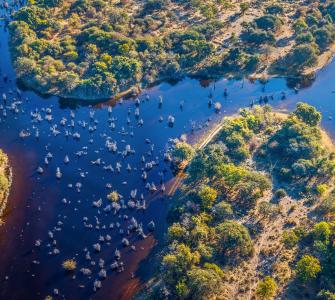The economic value of the ecosystem services provided by the Okavango Basin
The Okavango Basin is one of the largest freshwater wetlands in southern Africa, an oasis of life that supports significant biodiversity. The ecosystems within the Basin provide numerous benefits to local people and the basin is the main water source for one million people across the three countries in which it spans (Botswana, Namibia, and Angola). The Delta, specifically, is an important tourist attraction, and therefore it is a source of income and employment for the local people living within its extent.
These and other benefits (e.g. climate regulation, food provision, spiritual values) provided by Okavango Basin contribute either directly or indirectly to human well-being, whether at a local, regional or global level. Valuing the multiple ecosystem services provided to society by this catchment is necessary for the funding, sustainable management and further protection of its ecosystems. Ideally a combination of market and non-market-based institutions is necessary to enable its effective and sustainable management.
CSF, working in support of the Wild Bird Trust (WBT), is carrying out an analysis to assess the economic value of ecosystem services delivered by the Okavango Basin. Through this, we aim to make “the economic case for conservation” that justifies the investment of funds in the protection of the Basin, provides a better understanding of the flow of funding (e.g. how much of the revenues generated by tourism are invested in the area) and its efficacy. This analysis will also help to better understand the potential to develop compensation mechanisms for human-wildlife conflicts.
With this valuation of ecosystem services, decision makers can better understand the Basin’s value to society, and are better able to assess the costs of its loss or the benefit of its protection.
This work forms the initial phase of ongoing efforts to identify financial mechanisms to capture the value of the ecosystem services, increasing the flow of funding towards nature conservation and restoration in the area, with a special interest in creating incentives to involve local communities in order to improve their well-being.
Photo Credit: Shutterstock, Okavango Delta

